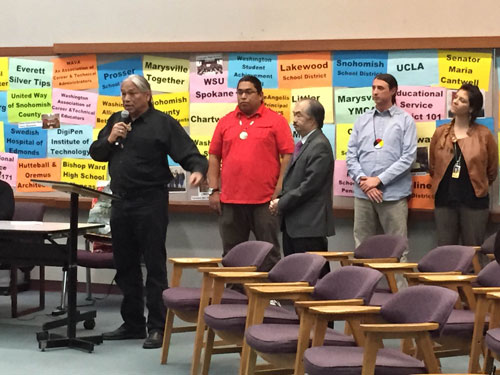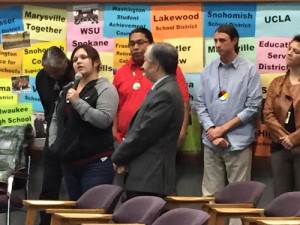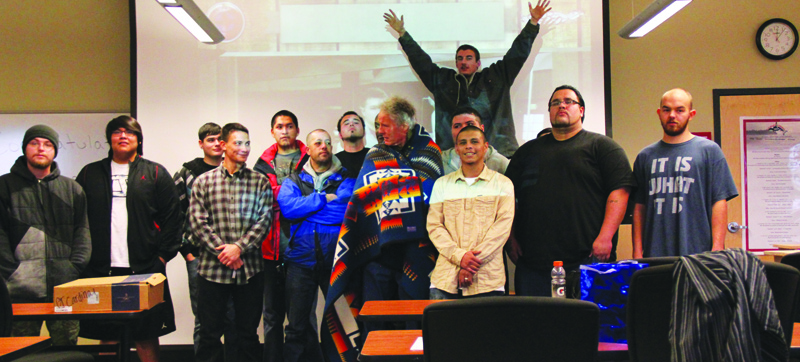By Tulalip News staff
TULALIP – Heritage Hawks played the Orcas Christian Saints last night on their home turf and handed the Saints a crushing loss, 76-63.
syəcəb
By Tulalip News staff
TULALIP – Heritage Lady Hawks hosted the Orcas Christian Saints last night and took a loss. 17-49, despite playing one of their best quarters this season.
“It’s hard playing with only five girls. I woke up this morning thinking we should just forfeit this game, but I thought no,” said Cyrus “Bubba” Fryberg, Lady Hawks head coach. “That second quarter was the best we’ve looked all season. We played it well. We just have to keep it going.”
Tulalip Heritage – 0 10 5 2 — 17
Orcas Christian – 13 11 17 8 — 49
Click the highlighted link below to download the December 17, 2014 Tulalip See-Yaht-Sub
Click here to download Dec 17 SYS

MSD adopts Since Time Immemorial curriculum during regular board meeting
By Brandi N. Montreuil, Tulalip News
MARYSVILLE – The work to correct history began long before the Marysville School Board met on December 8, to vote on adopting accurate tribal history and culture via the Since Time Immemorial curriculum into their district schools. The idea was first introduced by then newly elected Rep., John McCoy (D-Tulalip), in HB 1495 on January 26, 2005. The bill proposed requiring school districts to offer tribal history and culture along with Washington State and United States history curriculum. It passed 78-18 in the House on March 9, 2005. However, since then school districts have lagged in offering accurate tribal history on the 29 federally recognized tribes located in Washington state. On December 8, MSD decided to unanimously pass adopting the Since Time Immemorial curriculum as part of required curriculum in all their schools.
“This is awesome. This is a big district and to have a school board adopt it means a lot to us at the Native Office of Education, us as Indian people, and the people who created it. This is a great thing, because they are saying how important it is to start teaching about our history and our culture,” said Denny Hurtado, the outgoing Director of Washington Office of Native Education, following the vote.
STI is the result of partnership between the State of Washington Office of Superintendent of Public Instruction, private and public agencies and several of the 29 federal recognized tribes in Washington state. The curriculum provides a basic framework of Indian history and understanding of sovereignty for grades k-12. Aligned with the Common Core standards for English, language and art, STI lessons can be adapted by teachers to reflect the specific histories of tribes in their local area.

Teachers Shana Brown from the Seattle School District who is of Yakima dependency, Jerry Price, a middle school teacher with the Yelm School District and Elese Washines, an educator in the Yakima Nation Tribal schools, developed the curriculum under the leadership of Hurtado. STI was designed not just for non-Native students, but also for Native students. Its purpose, explained Hurtado to MSD board members, is to breakdown Native American stereotypes and misconceptions and to build bridges between tribal communities and non-Native communities.
“All they [students] know about us is what they learned in school, which is very little, and what you see on TV, which is not true, and what you read about during Columbus Day and Halloween,” Hurtado said before the vote. “I didn’t want this curriculum to seem like it was just an Indian thing. This was a true partnership to develop something good for our school to use. The purpose is to build bridges between our community and your community. That is a big point for us Indian people, because we have a lot of mistrust of the education system because our first experience of education was the military boarding schools.”
Over 1,000 teachers have received STI training by the Washington State Office of Native Education and 30 percent of school districts in Washington are using STI curriculum in some shape or form. Montana, Oregon and Alaska have also adopted STI curriculum in their school districts, and currently the Seattle School Board is looking into implementing it into their schools.

Matt Remle, a Lakota Native from the Standing Rock Reservation and Native American Liaison with MSD, who was present for the voting, said the change was long overdue. Fellow liaison, Eliza Davis, Tulalip tribal member, said the history of her own Tribe was lacking during her high school education.
“I graduated from Marysville-Pilchuck High School. I remember in Washington State history we watched the movie “Appaloosa.” That is what I remember of Washington State history. I don’t remember learning a whole lot about our Indian people or about Tulalip Tribes. I support the curriculum 100 percent. It is so important for our kids, all of our kids, and the whole community to understand the true history of all Washington Tribes, and also the history of Tulalip, Marysville, and what Tulalip does for this community as a whole. I think adopting this curriculum is the right direction.”
“I am excited for this day. I am excited about this and I am ready to approve this. We should have had this a long time ago,” said MSD board member Chris Nation right before the unanimous vote.
For more information on STI, please visit the website www.indian-ed.org.
Brandi N. Montreuil: 360-913-5402; bmontreuil@tulalipnews.com
Tulalip Heritage Hawks took a win, 52-48, over Grace Academy Eagles in tonight’s game played at the Francy J. Sheldon Memorial Gymnasium at Heritage High School.
Watch a replay of tonight’s game on-demand at www.tulaliptv.com.
Tulalip Heritage Lady Hawks hosted the Grace Academy Eagles tonight and lost. Final score 4-49. You can watch a replay of the game on-demand at www.tulaliptv.com.

By Micheal Rios, Tulalip News
Sixteen students celebrated their graduation from an intensive three month pre-apprenticeship construction trades program on Monday, December 8, at the Tulalip Tribes administration building. The program, which is managed by the Tulalip TERO department, is the first state recognized Native American pre-apprenticeship program in the United States. The program is accredited through the Edmonds Community College and all in class curriculum has been formally approved by the Washington State Apprentice and Training Council. The three month course provides students instruction in the basics of the construction trade. In addition, they are awarded certifications in flagging, first aid/CPR, and an OSHA 10-hour safety card. Upon completion of the program students are ready to safely enter the construction work environment.
During the graduation ceremony, students shared what the program has meant to them, their favorite part of the program, and what their goals are after graduating. TVTC graduate Aaron Kornish commented on his favorite part of the program, “the opportunities of learning how to build things with various techniques, getting the opportunity to meet different trade representatives, and having the opportunity to expand my horizon.”
While presenting their final thoughts to the audience of family, friends, trade representatives, and community members, students also presented their personal projects, a project they build as a class final that encompasses all the techniques and concepts they’ve learned over the past three months. Some projects included a skate board ramp, a four foot tall dresser, a cabinet for PlayStation 4 games, and an entertainment center.
Tulalip vice-chairman Les Parks delivered a brief speech to the graduates and audience members before the diplomas were handed out, noting that after graduating high school in 1975 he started a construction training program that was very similar to the TVTC program. “My recommendation to the students is to follow your dream, find your passion, find what fits you and go for it. Make it work,” Parks expresses to the students, “Wherever you find your passion, follow it, and make it work for you.”
Mark Newland, nine year instructor of the construction program, was presented with and wrapped in a Pendleton blanket by his graduating students to honor all the hard work and dedication he has given to his students and the program.
This winter session marked the second successful completion of the program since undergoing reform. No longer titled the Native American Construction Trades Employment Program (NACTEP), the program has been transformed into the TERO Vocational Training Center (TVTC) and is completely funded by Tulalip TERO in partnership with Washington State Department of Transportation (WSDOT) and the Tulalip Foundation. TVTC classes are offered at no charge to Tulalip tribal members, tribal members of federally recognized tribes, spouses/parents of Tulalip tribal members, and employees of the Tulalip Tribes. The next TVTC session starts January 27, 2015. For more information contact Lynne Bansemer, TERO Client Services Coordinator, at (360) 716-4746 or lbansemer@tulaliptribes-nsn.gov.
Winter Quarter Graduates
Bradley Althoff, Tulalip
Mangus Bauer, Round Valley Indian Tribes
Nathan Bayhurst, Tulalip
Leonard Begay, Navajo
Joe Fox, Tulalip Spouse-Parent
Arrion John, Yakima
Aaron Kornish, Parent of Tulalip Tribes
Jordan Laducer, Turtle Mountain Chippewa
Micah Laducer, Turtle Mountain Chippewa
Blaze Medina, Tulalip
Dylan Monger, Tulalip
Greg Moses, Tulalip
Robert Ramos, Tulalip
Dylan Rivera, Yakima
El Tico Tyson, Spouse of Tulalip
Tyrone Yazzie, Navajo
By Crystal Reyes, Child Advocate, Tulalip Legacy of Healing
Darkness to Light believes that adults should be taking proactive steps to protect children from this significant risk. It is unrealistic to think that a young child can take responsibility for fending off sexual advances by an adult. Adults are responsible for the safety of children. Adults are the ones who need to prevent, recognize and react responsibly to child sexual abuse. Yet, the statistics clearly show that adults aren’t shouldering this responsibility. Darkness to Light believes that adults just don’t know how.
Think About It
It’s unrealistic to expect a six-year-old to fend off sexual advances from an adult relative. Children often cannot recognize sexual advances for what they are, and have been taught to “mind” adults who are authority figures.
Adults are Responsible for the Safety of Children
As adults, we strap babies into car seats, we walk children across busy streets, and we ask teenagers questions about where they are going and who they will be with, all to keep them safe. As adults, we should also be responsible for protecting children from sexual abuse.
Why, then, are we at such a loss when it comes to protecting children from sexual abuse? Child abuse statistics show that adults do not adequately protect children from child sexual abuse, and the main reason is that they don’t know how.
Research suggests that adults are unaware of effective steps they can take to protect their children from sexual abuse. Most do not know how to recognize signs of sexual abuse and many do not know what to do when sexual abuse is discovered.
There are several well-known and successful programs that teach children age-appropriate self-protection skills and techniques. These programs also teach children about physical boundaries, and about discerning types of touch. These programs are valuable to children, and the skills they teach have thwarted abductions and sexual assaults. However, this is simply one part of a larger prevention and protection plan. We must not fall into the trap of thinking that these skills alone are “good enough.”
Reporting Child Sexual Abuse to Authorities
Do you know where you would go to get help if your child was sexually abused? Do you know what agencies would be involved, or whether you would need to call the police? Finding out these answers ahead of time can make a tremendous difference in how a child’s case is handled.
Agencies that Handle Reports of Child Abuse
These agencies handle most reports of child abuse:
Child Protective Services (CPS) – 1-866-829-2153
Tulalip Tribal Police – 360-716-9911
The Police – 911
What if I’m not sure? Where do I go?
Legacy of Healing Children’s Advocacy Center coordinates with legal and social services professionals in a case. If you are unsure about making an official report or are in need of support, please contact us at 360-716-4100. We will help assess your suspicions.
For more information on Child Sexual Abuse please go to http://www.d2l.org